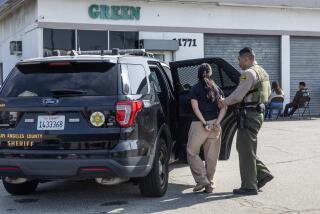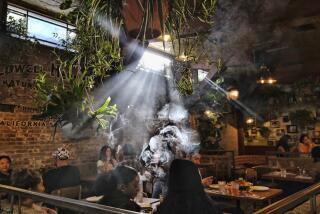Fair Deal? : Card Rooms Say City Has Stacked Deck Against Them
The joint opened at 10 a.m. and the Big Joke was making the rounds within minutes.
“Mobsters, heh, heh,” an old guy chuckled. He elbowed someone next to him. “Hey, Joe, I didn’t know you was a mobster.”
Joe rolled his eyes and scoffed. “Sheesh. Yeah, right, we’re all mobsters.”
They all laughed, sipped coffee and blew cigarette smoke into the bluish air, then shook their heads at the absurdity of it.
The Big Joke was tacked on the wall of the Lucky Lady, with seven tables the city’s largest card room: A newspaper photo of some elderly card-playing patrons, the caption asking, sarcastically, whether card rooms were a front for mobsters.
Good press is hard to come by these days--card room owners and patrons distrust the local media as much as the cops and City Hall--and Lucky Lady owner Stan Penn, being a nervous guy, hurriedly clipped and displayed the photo.
“That’s all we ask is a fair deal,” said Penn, a man so frustrated he can barely complete a sentence when he talks about the city’s effort to close San Diego’s card rooms.
“I, we, I mean . . . we’re pure white here,” he sputtered. “We go by the law. I’ll put the Lucky Lady up against any business in San Diego.”
That is the crux of the battle between the city’s 13 remaining card rooms and City Council: Are the card rooms honest mom-and-pop establishments or magnets for loan-sharking, bookmaking, prostitution, drugs and fencing stolen goods?
“These places attract a lot of criminal activity,” said Lt. Leslie Lord, head of the Police Department’s vice squad.
“These are respectable citizens being unfairly persecuted,” countered Andrew Kopel, a Sacramento lawyer representing several San Diego card rooms and the executive director of the 400-member state Card Room Assn. “We have to convince people that these places are almost crime-free.”
Card room owners consider a June 20 recommendation by the City Council’s Public Services and Safety Committee to be the first positive development affecting their industry in recent years, but one that is negligible in the long run. The committee voted to allow card rooms to raise the hourly table fee charged to players from $2.50 to $5.
The council capped the fee in 1976 and repeatedly has ignored card rooms’ requests to raise the fee to offset their rising operating costs.
The council, which has regulated card rooms since the 1940s, tightened down in 1983 by deciding to issue no new card room licenses; prohibiting owners from transferring, selling or willing their licenses; limiting to seven the number of tables in each card room and implementing a host of other restrictions.
The “sunset” regulation calls for closing card rooms within city limits by the end of 1995, but several owners who had business licenses before 1983 can keep their places open until they die.
Although the council has pushed card rooms to the brink of extinction, there is a piece of the puzzle missing, a major piece that the vice unit is busy searching for: proof of criminal activity--if not for a court of law, then enough for council members, who hold the ever-tightening legislative noose around the card rooms’ necks.
For years, the council has taken the Police Department at its word that card rooms attract and generate crime.
Council members, no doubt, would like to have piles of felony arrests and convictions to support their card room restrictions, but those are not needed. Deputy City Atty. Joe Battaglino said a “factual basis” for such restrictions could be anything from police opinions to public testimony to “common sense.”
San Diego’s card parlors have been cited for infractions such as expired dealer licenses and alcohol violations--”really light stuff,” Lord, of the Police Department, acknowledged--but there have been few felony arrests.
This is because of the nature of the crimes occurring around card rooms, Lord said, crimes such as loan-sharking and illegal gambling that can be exposed only through lengthy undercover operations.
“This isn’t everyday street crime that represents itself in typical statistics,” Lord said. “You have to go under cover, and it takes a long time to be accepted into the group.”
To that end, the vice squad has had plain-clothes detectives “gathering intelligence” in card rooms for the past few months, compiling “comprehensive reports” of criminal activity, Lord said.
The City Council will probably delay voting on the table-fee recommendation for 60 to 90 days until the undercover investigation is completed.
Even if widespread crime is revealed, however, do not expect a rash of felony arrests. Few of the cases would be “trial-worthy,” because there will be little or no hard evidence, and weeks will have passed since the crimes occurred, Lord said.
“It’s hard to prove a case, months later, against a guy who comes back from the restroom with a white powdery substance around his nostrils,” she said.
“That’s the Catch-22: If we want to catch them at something big, we have to go in dirty (undercover), but, if we go under cover, then it’s difficult to make a case in court.”
Lord acknowledged that this reasoning is convenient for the police and City Council, an open-ended justification for cracking down, but she emphasized that vice’s goal is not arrests and convictions but collecting enough data for the council to continue its legislative stranglehold.
The card rooms are calling the council’s and police’s bluff, Penn said.
“Where’s the proof, huh?” he said. “Where is it? The police say all these things, but what do they have? Nothing. They got nothing.”
Louis Katz, Penn’s lawyer, added: “It’s almost humorous. They’ve had 14 years to come up with something.”
Even Councilman Ron Roberts, a Public Services Committee member who voted against increasing the card rooms’ table fees, said: “It’s time for the police to put up or shut up.
“It would be fair to boost the fees, but I wanted to wait for the police’s investigation to see if they can substantiate their allegations. I’d like to clear the air.”
Meanwhile, life goes on inside the card rooms, mostly a collection of small, weathered rooms that resemble and smell like old VFW recreation halls.
Four games are allowed--high and low draw poker, contract and auction bridge--but everyone plays low poker.
In the Palomar Card Club, a tiny room along El Cajon Boulevard, the patrons included men and women, old and young, white, black, Asian and Latino, mostly pale people who came blinking out of the sun to smoke, drink coffee and gamble, a blue-collar crowd with weary eyes concentrating on their cards and stacks of colored chips.
In the Lucky Lady, another small, storefront place farther up the boulevard, four tables were crowded before noon.
Middle-age and old men sat around, talking under the yellowed lights and the hum of the air-conditioners, breathing air thick with smoke and the smell of coffee grounds, old carpeting, hair tonic and cologne.
Most players knew each other, but a few held their cards tightly, looking like wary dogs guarding their food.
“We’re so honest, we’re so harassed it’s scary, we, I . . . ,” Penn said, flustered and angry, his hands searching for the words.
He said it with such conviction--such earnestness--that you expected to see the Pope dealing low draw straights--ace, two, three, four, five--to Ozzie, Harriet and Mother Theresa in a corner table with a troop of Boy Scouts serving tea and crumpets all around.
Penn’s daughter appeared, staring intently, defiantly, seemingly waiting for someone to dispute her father so she could put down her infant son and take on all challengers. No one disputed Penn here; they all were in his corner.
“That’s right,” said Jack Laverick, a retired Air Force lieutenant colonel and long-time patron. “We’re mostly retirees, military, doctors, lawyers, cops. All those allegations are ridiculous. I’ve never seen a prostitute in here.”
A matronly woman--one of the dealers--came over. “And I resent being called a prostitute,” she added.
Coffee girls in tight dresses moved about the room. There was the slap-slap of cards on the green felt tables, the clicking of poker chips like a million dominoes falling out of sequence, the hiss of cigarettes doused in coffee cups, the dealers’ hands shuffling, dealing, doling pots, collecting cards, always darting across the green felt, which had gone slack with age.
Most players here win or lose $30, $40, $50 a day. At the big-stakes game under the TV, the pots were hundreds of dollars. Players talked less here, laughed less, concentrated more. A portly man with hands like meat hooks fingered his stacks of orange $100 chips on the table.
“Those allegations are such a stupid joke,” said Mack McGraw, who retired from General Dynamics a few years ago. “I’ve seen more crime in a grocery store. This place gives us old guys someplace to go while the wives go shopping.”
More to Read
Sign up for Essential California
The most important California stories and recommendations in your inbox every morning.
You may occasionally receive promotional content from the Los Angeles Times.










